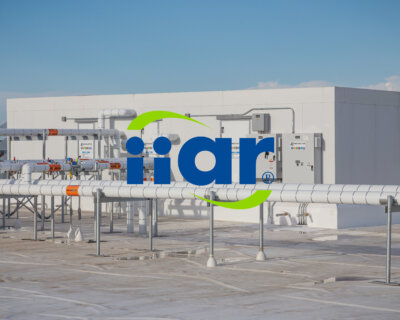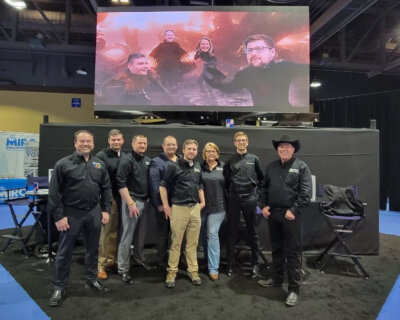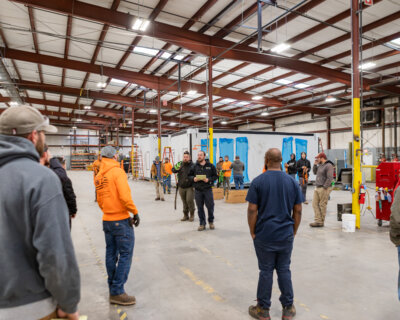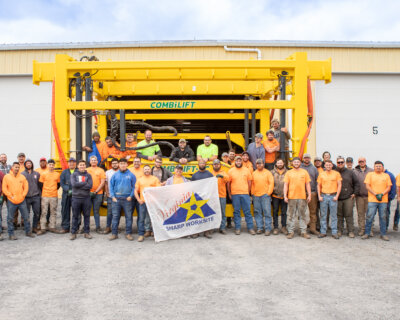
Day in the Life of an Industrial Refrigeration Service Technician
As a modern-day industrial refrigeration service technician, I have been fortunate enough to travel to nearly every state in America and work on various refrigeration systems. This career blends both mechanical and electrical trades, requiring a journeyman skill level in both. Today’s refrigeration systems use an array of pressure sensors, level controls, and leak detection equipment for safe and efficient operation. This is an excellent opportunity for someone with strong mechanical or electrical skill sets to cross-train. The possibility of going to work one day and repairing mechanical components, troubleshooting electrical issues, and diagnosing PLC issues keeps this job exciting. (The nation-wide travel is pretty great, too.)
I’ve met many people over the last 13 years here at Innovative and have enjoyed getting to know them and their systems and partnering with them to keep things running smoothly. I’ve been places and experienced things many tradesmen never will. I’ve worked on -60 degree blast freezers in the sweltering Dallas, Texas summer heat. I’ve worked on controls systems in the middle of winter in Anchorage Alaska where the ambient temperatures were colder than the storage freezers and you had to dodge moose when driving in to work in the mornings. I’ve seen dust devils blow across the sand flats outside Phoenix, Arizona while running conduit on a rooftop and had fighter jets buzz the roof top I was working on from Nellis Air Force base in Las Vegas, Nevada. I’ve seen farmers in flyover states planting & harvesting crops ’round the clock. I’ve had to stop for alligators to cross the road while working on a major controls installation in Houma, Louisiana. I’ve heard elk bugle from a rooftop in Post Falls, Idaho and listened to a Saturday night mariachi band in Ventura, California. I’ve seen mountains disappear in a mid-winter blizzard in Coxsackie, New York, and seen tornadoes touchdown in Champaign, Illinois. I’ve commissioned multi-million dollar systems that sparkled like new money and installed state of the art controls systems on plants that many would have abandoned. I’ve covered the highways and byways of 47 states and flown in and out of nearly every major airport in the country with a tool box in tow.
The equipment I have worked on over the years has been as diverse as the places I’ve been. As an industrial refrigeration technician, I have serviced systems as small as two-ton commercial air conditioning equipment used for cooling control rooms that utilized R22 and scroll compressors controlled by the simplest of wall mount thermostats; I’ve also worked on commercial refrigeration equipment that used R22, R404A, R410A, or R507 to cool a variety of storage and production areas. Industrial equipment has ranged from small skid mounted systems with capacities barely over 100 tons, to very large systems with capacities well in excess of 1,000 tons utilizing R22, R507, R717 and R744. From screw compressors manufactured by Frick, FES/GEA, Howden, Mycom, Kobe, and Vilter to reciprocating compressors by Frick — the old, low-speed “double lung” machines, to Mycom, Vilter and Grasso. Other types of equipment serviced and commissioned over the years ranges from low pressure boilers, to oil-less air compressors, ice makers, production equipment of every possible configuration, heating systems of electric and the gas fired types, Variable Frequency Drives, soft starters and numerous different controls systems, even down to the high speed roll up doors commonly found in today’s cold storage warehouses.
On and on goes the list of places I’ve been, equipment I’ve serviced and people I’ve met. To stay competitive, industrial refrigeration technicians need to keep pace with the new technologies and rules associated with our trade. This has been a great career choice for me over the last 13 years, and I plan to stay in this field for quite some time.





